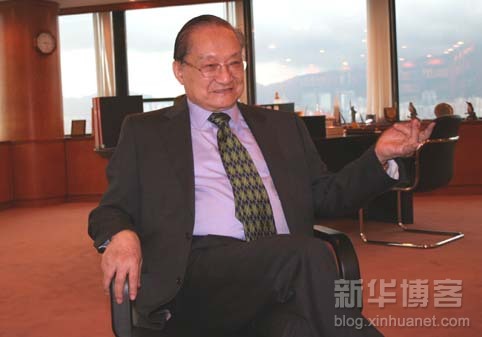| Home / China / Opinion | Tools: Save | Print | E-mail | Most Read |
| Louis Cha: HK Will See a Brighter Future |
| Adjust font size: |
In 1992, Louis Cha aka Jin Yong was commissioned to write an article about the handover of Hong Kong back to China. In this article, he forewarned that freedom of the press in Hong Kong could be adversely affected under Chinese sovereign rule.
"In retrospect, I think I made a wrong prediction," Louis Cha says today, in an interview with Reference News, under Xinhua News Agency, shortly before the 10th anniversary of Hong Kong's return. Louis Cha is one of the most famous and influential Chinese writers alive and his fiction has garnered praise across China and Southeast Asia. His background in HK journalism comes from his position as editor-in-chief of daily newspaper Ming Pao, a position he has held until 1993. Speaking about his feelings in 1992, Cha reveals he had mixed feelings at the time. While being happy at the handover, he was always fearful his property and rights such as freedom of the press would be taken away. Cha's words are reflective of a wider collective feeling from pre-1997 Hong Kong. On July 1, 1997, the first day of Hong Kong's return, several local newspapers ran articles which showed a severe concern about Hong Kong's future. One voice which went against the flow was, however, that of Louis Cha. Ming Pao carried his essay which indicated a belief that guided by the "One Country, Two Systems" policy, the Chinese central government would not seek to impose its political and cultural values on Hong Kong. As early as 1981, Cha was received by Deng Xiaoping, then leader of China, in Beijing. During the meeting, Deng and Cha discussed several major issues concerning China's development, including Hong Kong. Cha recollects that Deng said "Hong Kong people did not need to worry about their future. He asked me to convey his words to them when I went back." Three years later, Cha was invited to join the Drafting Committee for the Basic Law of the Hong Kong Special Administrative Region. Fearing a conflict of interest with his position at Ming Pao, he was initially reluctant to accept this position. However, he soon realized the Basic Law would define the future of Hong Kong and that he could influence its development. The process took over five years during which Cha often clashed with fellow committee member, the late Xiao Weiyun, a professor of Peking University. "Professor Xiao and I disagreed with each other sometimes and even got into fierce arguments in front of the press. Ultimately, we respected each other and became friends." The handover ceremony on July 1, 1997 will forever stay in Cha's memory. As the United Kingdom formally bid farewell to its former dependency, Cha's worries vanished as he placed his faith in the Sino-British Joint Declaration and the Basic Law of Hong Kong which clearly stipulate Hong Kong's lifestyle and economic system will remain the same. While staying in Hong Kong, he usually reads five or six newspapers every day. "In the decade since handover of Hong Kong, freedom of the press in Hong Kong has not been curtailed," he commented, adding that his optimism for the new era of Hong Kong imbues him a wider sense of confidence in the future of the world. (China.org.cn by Pang Li, June 28, 2007) |
| Tools: Save | Print | E-mail | Most Read |
 |
| Related Stories |
|
